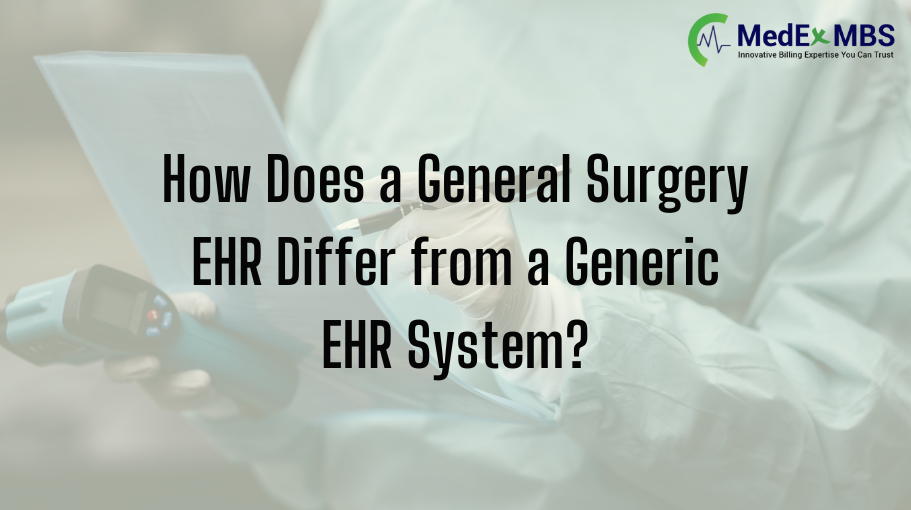How Does a General Surgery EHR Differ from a Generic EHR System?

Currently, approximately 96% of hospitals in the United States utilize an Electronic Health Record (EHR) system; however, nearly half of surgical specialists continue to rely on generic systems. This leads to slower documentation processes, an increase in the number of clicks required, and the omission of crucial details essential for surgical care. Research indicates that transitioning from a generic EHR to a platform specifically designed for surgery can enhance documentation efficiency from 6.02 to 7.20 on a scale of 10. This transition results in more precise records, improved claim tracking, and enhanced workflow support. But what precisely distinguishes a general surgery EHR from a generic one? Why is this distinction significant for surgeons, patients, and hospitals? Let us begin with the fundamentals. What Distinguishes General Surgery EHR from Generic EHRs? Not all EHR systems are created equal. A general surgery EHR is specifically tailored for the workflows associated with surgical billing systems, whereas a generic EHR offers only broad, standard functionalities. A general surgery EHR encompasses templates for pre-operative and post-operative procedures, along with tools for creating operative notes. It also features surgical scheduling capabilities and coding tools specific to surgery. In contrast, a generic EHR provides basic functionalities such as charting, scheduling, and lab orders. However, surgeons frequently require customization, which can hinder efficiency and increase the likelihood of billing errors. Comparison of General Surgery EHR and Generic EHR General Surgery HER Generic EHR Templates for Pre-op, intra-op, and post-op Basic charting templates OR block scheduling and surgical calendars Standard patient scheduling CPT, ICD-10, and modifiers tailored for surgery General coding support Auto-populated operative notes Manual or limited note fields Tracks global periods and compliance Limited compliance features Reduces denials, maximizes revenue. Higher risk of errors and lost revenue What is a General Surgery EHR? A general surgery electronic health record (EHR) denotes a digital record system tailored specifically for surgical practices. It aligns with the workflow of surgeons, resulting in more precise documentation, easier compliance, and the ability for practices to secure full reimbursement. What is a Generic EHR? A Generic EHR is a flexible electronic health record system designed to serve multiple specialties. It provides fundamental EHR functionalities. While a generic EHR is effective for routine care, it typically lacks surgical templates and billing tools. Workflow in General Surgery EHR vs. Generic EHR General Surgery EHR Workflow An EHR tailored for the surgery streamlines the entire process. Pre-operative procedures begin with integrated templates. Operating room time is scheduled directly within the system, eliminating unnecessary back-and-forth communication. Subsequently, it applies the appropriate CPT codes and modifiers according to U.S. regulations to mitigate billing errors. Follow-up appointments are linked to the same episode of care, ensuring that nothing is overlooked. Generic EHR Workflow In contrast, a generic EHR requires more effort for every task. Pre-operative and post-operative notes must be created from scratch or extensively modified. Operating room scheduling occurs outside the system, leading to delays and miscommunication. Operative notes are entered manually, increasing the likelihood of omitting important details. Billing necessitates a review of codes and modifiers due to the absence of surgery-specific prompts. Additionally, follow-up appointments are monitored as standard office visits, resulting in compliance issues and slower reimbursement. Step in Workflow General Surgery EHR Generic EHR Pre-Op Prep Integrated surgical templates Custom notes created manually. OR Scheduling Direct operating room block scheduling Managed externally or with additional tools Operative Notes Auto-filled procedure fields Manual, labor-intensive entry Billing & Coding Surgery-specific CPT, modifiers, and global period tracking General coding: high risk of errors Post-Op & Follow-Up Bundled care is automatically tracked Handled as regular visits; risk of missed compliance. Differences Between General Surgery EHR Billing and Generic EHR General Surgery EHR Billing Specialty coding: Incorporates built-in CPT and ICD-10 codes specifically for surgical procedures. Modifier support: Automatically applies the appropriate surgical modifiers. Global period tracking: Monitors bundled pre-, intra-, and post-operative periods to prevent double-billing. Op note integration: Extracts billing codes directly from the operative note. Fewer denials: Surgery-specific validations minimize coding errors and denials. General surgery billing software leads to expedited claim submissions, cleaner claims, reduced denials, and enhanced reimbursement accuracy. Generic EHR Billing Basic Coding Support: Manages general CPT/ICD-10 codes but lacks the specificity required for surgical procedures. Limited Modifier Use: Modifiers often need to be manually added by coders or billers. No Global Period Tracking: Considers follow-up visits as separate appointments, which may lead to compliance issues and denials. Manual Data Entry: Operative details do not automatically link to billing; coders are required to manually extract the information. Higher Denial Rates: Increased errors and missed charges arise from the absence of specialty-specific checks. In comparison to general surgery medical billing software, generic billing necessitates more manual effort, results in higher denial rates, prolongs the revenue cycle, and increases the risk of underpayment for surgical practices. What are the Advantages and Disadvantages of General Surgery EHR and Generic EHR? General Surgery EHR Advantages Disadvantages Templates tailored to the specialty Higher expenses in comparison to general EHRs Management of OR block scheduling and surgical workflows May necessitate additional training for staff to utilize advanced functionalities Integrated surgical coding support (CPT, ICD-10, modifiers, global periods) Demands extensive staff training Enhances billing precision and decreases claim denials Excessive dependence on EHRs Boosts compliance with specialty-specific regulations The implementation process is prolonged. Generic EHR Advantages Disadvantages Lower initial costs compared to specialty EHRs Lacks templates and workflows specific
